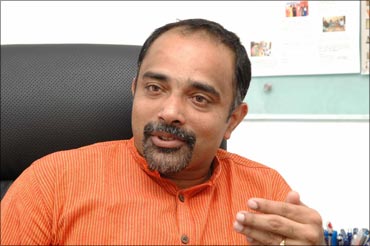
When rediff.com met Paul Basil in 2004, he was running RIN (Rural Innovation Network), which he had started in 2001, with just three people and Rs 20 lakh (Rs 2 million).
RIN promoted rural innovation-based enterprises as a business incubator that turned grass roots innovations into commercial enterprises.
In 2004, RIN was functioning from a small place in a non-descript area in Chennai. Today, RIN has a collaboration with IIT-Madras and uses space at the IIT-Madras Research Park.
A lot has happened in the last seven years. Above all, RIN has become Villgro, a not-for-profit organisation today.
Paul Basil, a mechanical engineer with a post-graduate degree in forestry management-turned-entrepreneur, talks about how RIN became Villgro and its current activities in this exclusive chat.
. . .
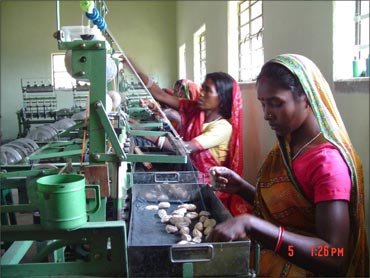
How RIN became Villgro
By 2009, we wanted the name to emphasise what we do. We were working for the growth of rural India and also telling entrepreneurs, you will grow.
We also wanted to communicate more stories around growth, and more so, growth in villages. So, we decided to play with the words, and there came Villgro!
Personality change with name change
Once we became Villgro, there was a personality change too. We used to work with very grassroots innovators.
What I have learnt in the last seven years is that making them successful is really difficult because they may have great ideas but they are not entrepreneurs . . . so you had to work a lot with them, hand-hold them for so long that the journey was very tiring.
Entrepreneurship has to impact people's lives. This was limited in the hands of grassroots innovators. An innovation has to become an enterprise to reach people. I felt if we provide the same kind of support to the more empowered entrepreneurs, it would reach more people.
. . .
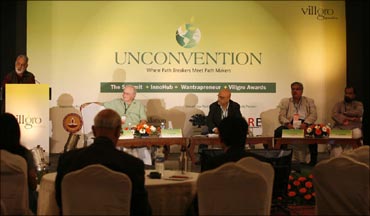
The journey of an innovator
It is like running a relay race. We have to, at some point, pass on the baton. When an investor comes in, the entrepreneur passes the baton on to get more capital and more professionals to help him continue the run.
We found that such a growth was not happening earlier. We evaluate an innovation on the impact it creates on people.
The role in 2001 and now
The role we play has not changed in the last 10 years.
In 2001 when we set up RIN, a number of enterprises and a number of innovators targeting villages of India might have been there, but there were no fora or platforms where they could get together.
Today, it has changed considerably. In all the campuses in India, there are social entrepreneurship forums, business plan competitions, etc.
Considering that 600 million people live in villages, this is still not enough but it is a good start.
Till 2007, there was not a single such conference but in 2007-08, there were one or two conferences. Now, on an annual basis, we have 5 or 6 such conferences on social entrepreneurship.
With more events, networking, connections, awareness and partnerships evolved. We do one ourselves now: Unconvention.
. . .

Identifying an idea
We go to such forums and conventions and meet new entrepreneurs. We do patent search and also have our own competition.
Based on a selection process from our experience, we select ideas. We see whether it is innovative, whether it will have an impact in the lives of rural poor and whether it will be commercially viable, maybe after 2-3 years, and if it is commercially viable, can it grow, and, lastly, whether the entrepreneur is capable enough.
Social entrepreneurship is catching up
I think after microfinance succeeded, people have started realising that there is a space and opportunity for business models in the rural areas. That is a big transformation.
Second, thanks to the success of microfinance, more and more investors had the courage to say that they would invest in these kinds of ideas.
Third, more and more people started doing research about the market. Because of fora, investors and networking, there is an increase in the knowledge available on the market. There is more documentation which gives courage to new entrants.
Four, a number of educational institutions giving social entrepreneurship as an elective have come up. Educated talent is coming into this field. Knowledge combined with talent is a great asset.
Also, it has become fashionable to be a social entrepreneur! So, I see a lot of people from the affluent sections of society willing to take the risk. Earlier, there were people from the affluent section running NGOs, but today, instead of running a plain vanilla NGO they are looking at this as a sustainable business model.
. . .
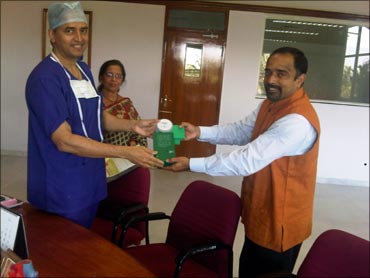
Running an enterprise in 2001
It was very difficult for us in 2001. Having said that, even today it is not easy to attract investors to an early-stage idea. For more proven, successful, growth stage companies, it is easy to get investors.
If you take the corporate sector, there is a lot of managerial talent there but in a small enterprise, you don't have that talent. So, investors are not confident to put their money in.
But in a growth company, it is different. By the time the idea gets established, they are able to attract managerial talent. That gives confidence to investors.
The role of Villgro in the initial stages of an enterprise
When we see a good idea, we give capital for it to establish. From 2001-07, we never used to offer funds; we only offered advice. But we found that our advice was of no use without capital.
From 2007, we were able to provide funds too. That is after we started working with the Lemelson Foundation of the United States. Recently, we have started getting funds from the Technology Development Board of India also. We have Rs 4-5 crore (Rs 40-50 million) to fund the innovators over a period of three years. We plan to take the funding to Rs 20 crore (Rs 200 million) soon.
With capital and advice, we are able to provide a company to move up.
So far, we have helped 50-55 enterprises. At present, we have 11 enterprises in our portfolio.
. . .
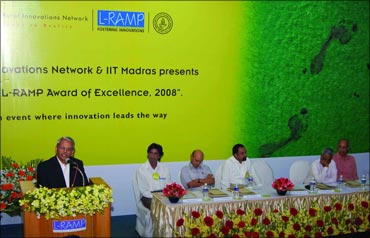
Success stories
Private investors started showing interest in rural enterprises only by 2009-10. Desi Crew got private investors. Then, there is a company in Bengaluru called Sustaintech that has attracted three investors.
One of the first innovations which we got involved in was the Venus Kerosene burner started by V Thiagarajan. He started it with nothing, but attracted quite a few investors. It has become a Rs 4-5 crore company. I would say this is a big success story.
The next, I would say is First Energy that makes cooking stoves that burn pellets made of agricultural waste. Companies manufacturing these pellets can be really, really big. There are nearly 500,000 such stoves in Indian villages. If pellet supply is not there, they go back to kerosene or firewood.
Social entrepreneurship, a course at IIT-M
We moved into the IIT-M Research Park to cement ties with the IIT. One of IIT-M's faculties, Dr Nagarajan, sits on our board of directors.
We came into this without any training. It is good to get proper training in social entrepreneurship. We helped the IIT in setting up a course two years ago, that teaches innovation and social entrepreneurship.
. . .
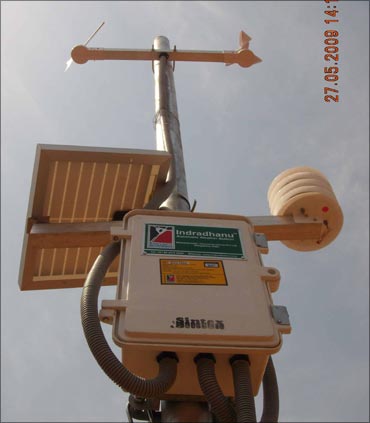
That is taken by students there and my hope is that more students will become social entrepreneurs. After it is stabilised, we want to replicate the course in other places too.
Future plans
Our future plan is to grow the incubation fund to around Rs 20 crore. Then, we can support more and more innovations. Till recently, we were focussed on product innovations but now, we want to focus on service innovations.
We have a fellowship program where entrepreneurs can experience rural India for 12 months. At the end of it, they will come with a clear idea on what rural India is what it wants.
What we need now is professionals, people from the industry with ideas. We want to tell them to help the poor people get richer by working on these business models!